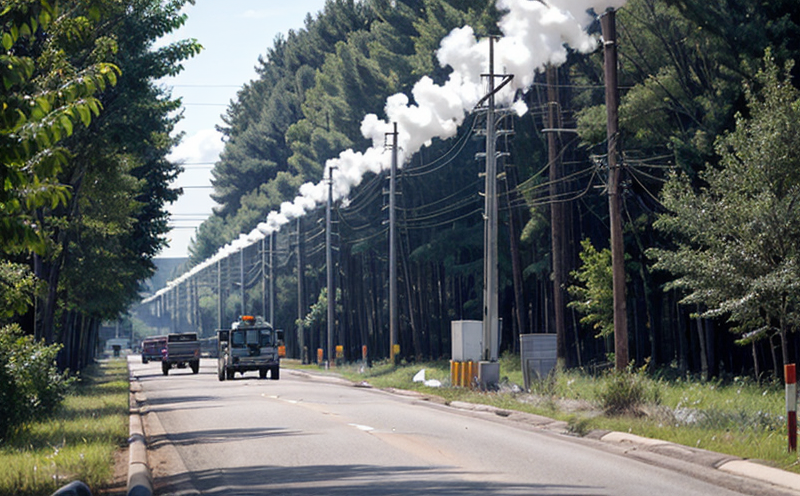ASTM E2742 Life Cycle Assessment for Utility Impact Testing
The ASTM E2742 standard provides a framework to conduct life cycle assessments (LCAs) of utility systems. This service is designed specifically for power and utilities companies seeking to understand the environmental impacts associated with their operations, from raw material acquisition through end-of-life disposal.
Life Cycle Assessment (LCA) is an important tool in today's regulatory landscape, especially within the energy sector where sustainability is a key concern. Utilities must comply with stringent emissions regulations set by bodies like the EPA and other international standards organizations. ASTM E2742 helps quantify these impacts, providing insights into how changes in design or operational practices can lead to reductions in environmental footprints.
The assessment covers various stages of the utility's lifecycle including resource extraction, manufacturing processes, transportation, installation, maintenance, decommissioning, and disposal. By incorporating data from all these phases, ASTM E2742 offers a comprehensive view of an organization’s overall environmental impact. This holistic approach ensures that no single aspect is overlooked when making decisions about improving sustainability practices.
One critical component of this assessment involves identifying hotspots – areas where significant emissions or resource depletion occur during the lifecycle. For utilities, these might include coal mining operations for thermal power plants or oil extraction processes used in generating electricity from fossil fuels. Understanding these hotspots allows companies to target specific parts of their supply chain for improvement initiatives aimed at reducing overall greenhouse gas emissions.
Another important aspect is quantification methods which vary depending on the type of utility being assessed but generally include data collection techniques such as lifecycle inventories (LCIs). These LCIs involve gathering detailed information about inputs and outputs throughout each stage of the lifecycle. Once collected, this data undergoes analysis to determine its environmental effects using Life Cycle Impact Assessment models (LCIA).
In summary, ASTM E2742 serves as a valuable resource for utilities looking to enhance their sustainability efforts by providing robust methodologies for conducting LCAs. It enables organizations not only comply with existing regulations but also anticipate future requirements while improving operational efficiency.
Why It Matters
Complying with environmental and emission compliance requirements is crucial for utilities given the significant role they play in global energy consumption patterns. Non-compliance can result in substantial financial penalties, reputational damage, and even legal action against companies involved.
For instance, under Title V of the Clean Air Act Amendments (CAAA) 1990, utilities are required to achieve compliance with stringent emission limits for various pollutants including sulfur dioxide, nitrogen oxides, particulate matter, and volatile organic compounds. Failure to meet these standards could lead to violations that impose costly fines.
Moreover, international accords such as the Paris Agreement emphasize reducing carbon emissions by promoting cleaner technologies across industries. Utilities must adhere to strict emission caps set forth by countries participating in this agreement. Non-adherence risks being subject to international sanctions and trade restrictions which further exacerbate financial losses for affected entities.
Additionally, stakeholder expectations play a crucial role influencing corporate behavior towards sustainability practices. Consumers increasingly demand transparency regarding the environmental impact of products and services offered by businesses including utilities. Companies that fail to meet these demands risk losing customer trust leading to decreased sales volumes and market share erosion.
The application of ASTM E2742 provides tangible benefits beyond mere compliance; it fosters innovation within the industry by encouraging continuous improvement processes aimed at minimizing negative environmental impacts. By identifying opportunities for reduction in emissions or resource usage, utilities can develop more efficient operations resulting in cost savings over time.
Eurolab Advantages
EuroLab offers unparalleled expertise and experience in conducting ASTM E2742 Life Cycle Assessments (LCAs) for utility systems. Our team comprises highly qualified professionals who possess deep knowledge of both the technical requirements outlined by ASTM standards as well as practical industry insights.
Our state-of-the-art facilities equipped with advanced instrumentation enable precise measurements necessary to accurately capture all aspects of a utility system's lifecycle. From sampling raw materials at extraction sites to monitoring waste streams during decommissioning, every step is meticulously documented ensuring comprehensive coverage.
We leverage cutting-edge software tools designed specifically for performing LCAs in accordance with ASTM E2742 guidelines. These tools facilitate efficient data management and analysis allowing us to deliver timely reports that meet the highest quality standards expected by our clients.
EuroLab's commitment to maintaining strict confidentiality ensures that all proprietary information remains protected throughout the assessment process. This safeguarding measure builds trust between ourselves and our customers fostering long-term partnerships based on mutual respect and reliability.
Competitive Advantage and Market Impact
Implementing ASTM E2742 LCAs through EuroLab positions utilities at an advantageous competitive position within their respective markets. This initiative demonstrates a proactive approach towards addressing environmental challenges faced by the industry today. Such leadership not only enhances corporate image but also opens up new business opportunities.
In an increasingly regulated environment, companies that demonstrate their commitment to sustainability are more likely to attract investors seeking socially responsible investments (SRI). By showcasing compliance with internationally recognized standards like ASTM E2742, utilities can build investor confidence boosting funding availability for future projects.
Moreover, early adoption of such practices allows organizations to stay ahead of regulatory changes. As governments continue tightening emission limits and introducing new policies favoring green initiatives, those already equipped with robust LCAs will be better prepared to adapt quickly minimizing disruption during transitions.
The implementation of ASTM E2742 also promotes internal efficiency improvements within utilities leading to enhanced operational performance. Through continuous monitoring and evaluation facilitated by LCA reports, management can identify bottlenecks in processes that hinder productivity or increase costs. Addressing these issues results in optimized resource utilization translating into reduced expenses while maintaining high standards of service quality.
In conclusion, incorporating ASTM E2742 LCAs into utility operations offers numerous strategic advantages contributing to sustainable growth and resilience against external pressures faced by the industry today.





